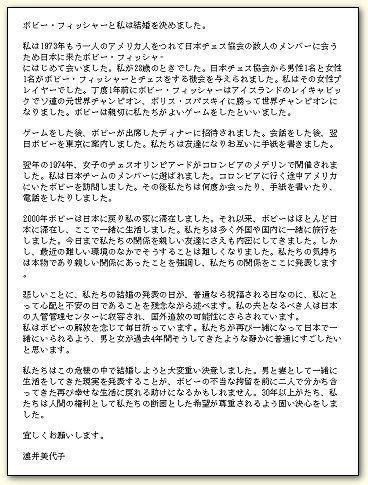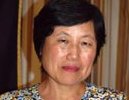
Miyoko Watai |
CNN is reporting that according to Fischer's attorney, Masako
Suzuki, the former champ had signed marriage papers with Japan Chess Association
President Miyoko Watai (picture left), which would be filed later
Monday. It is not immediately clear whether he would be allowed to marry and
whether marriage to a Japanese citizen would enable him to avoid deportation.
A Tokyo ward official, Yoshihisa Yabe, told The Associated Press that a person
in Fischer's situation would have to provide a valid U.S. passport or a U.S.
document confirming his citizenship's validity in order to get married in Japan.
Suzuki said Fischer and Watai had been living together since 2000.
Fischer's lawyer said she had also faxed a letter to U.S. Secretary of State
Colin Powell and the U.S. Embassy in Japan asking an American consular officer
be sent to him to accept his renunciation of citizenship, AP reported. In the
letter, Suzuki accused the embassy of refusing to send an official to Fischer,
requiring him to come to the embassy in person. Japanese officials, however,
will not allow him to make the trip, she said. [CNN,
Aug. 16, 2004: Detained chess legend set to marry].
Meanwhile Miyoko Watai has sent us the following statement (in Japanese and
English):
Bobby Fischer and I have decided to marry
 I
first met Bobby Fischer in 1973 when he visited Japan, accompanied by another
American man, to meet several members of the Japan Chess Association. I was
28 at the time. One male member and one female member from our Japan Chess
Association were offered the chance to play Bobby Fischer. I was the female
player. Just one year before, Bobby had become the Chess World Champion after
defeating former World Champion Boris Spassky of the Soviet Union, in Reykjavik,
Iceland. Bobby was gracious and said we played well.
I
first met Bobby Fischer in 1973 when he visited Japan, accompanied by another
American man, to meet several members of the Japan Chess Association. I was
28 at the time. One male member and one female member from our Japan Chess
Association were offered the chance to play Bobby Fischer. I was the female
player. Just one year before, Bobby had become the Chess World Champion after
defeating former World Champion Boris Spassky of the Soviet Union, in Reykjavik,
Iceland. Bobby was gracious and said we played well.
Soon after playing Bobby, I was invited to attend a dinner at which Bobby
was present. We spoke and the next day I gave Bobby a tour of Tokyo. We became
friends and we stayed in touch by writing to each other.
In the next year, 1974, the Women's Chess Olympiad was held in Medellin, Columbia,
and I was selected to be a member of the Japan team. On the way to Columbia,
I visited Bobby in America. Over the years since, we have seen each other many
times and have always kept in close touch by writing to each other and by talking
by telephone.
In 2000, Bobby returned to Japan and stayed with me at my home. Since then,
Bobby has spent most of his time in Japan and we have lived together here.
We have also traveled together extensively inside and outside Japan. Until
today, we managed to keep our relationship entirely private, even from our
closest friends. However, under the current difficult circumstances, this is
no longer possible. I am therefore releasing this statement about the background
of our relationship in order to stress that our feelings are genuine and are
based on our years of close companionship.
Sadly, I regret say that this day of the announcement of our impending marriage
– a day that would normally be one of celebration – is for me is
just another day of worry and anxiety. My husband-to-be is being held by Japanese
Immigration and faces possible deportation. I am praying every day for Bobby's
release, so that we can be reunited and be allowed to continue our life together
here in Japan, quietly and normally as man and woman as we have been for the
past four years.
We have taken the very serious decision to marry in the midst of this crisis
in the hope that disclosing the reality that we have been living together as
man and wife might help the two of us to return to that happy life we had been
sharing before Bobby's unwarranted detention. After more than 30 years, we
have made a very serious decision that we firmly hope will be respected as
the right of every man and woman.

The FIDE list of Member Federations gives Miyoko Watai as the President
of the Japan Chess Association (Zone 3.2a)
John Bosnitch, chairman of the Committee to Free
Bobby Fischer, informs us that Fischer and Watai have both completed and
signed the Japanese legal documents for marriage. The marriage documents have
been witnessed by John Bosnitch, a Tokyo-based Canadian communications consultant,
and by Mr. Shinobu Hano, a friend of Ms. Miyoko Watai. In addition, Mr. Ichiji
Ishii, former Vice Foreign Minister of Japan, has signed a new application
for Bobby Fischer's provisional release from detention. Bosnitch has urged
Japanese immigrations officials to consider Watai's relationship with Fischer
before deciding on the chess champion's fate. "If the officials were to
deport Bobby," Bosnitch said, "they would be depriving a Japanese
woman of her man, with who she has lived for four years."
On Thursday, August 12, Bosnitch submitted the initial documentation of Fischer's
German citizenship to the German embassy in Tokyo. The submitted papers, accepted
by embassy counselor Matthias Richter, include a certified copy of Fischer's
original birth certificate, which indicates that he was born to a German father,
establishing his German citizenship. However, until German officials acknowledge
the fact of his German citizenship in writing, Fischer is also seeking the
protection of the United Nations High Commissioner for Refugees for politically
persecuted and stateless persons.
Fischer's supporters are presenting the documentary proof of Fischer's German
citizenship so Japanese officials would have to deport him to Germany instead
of the United States if a deportation order were issued against him. Fischer
renounced US citizenship in a handwritten letter to the US embassy that was
delivered on Friday, August 6, after the US embassy consular staff repeated
refused to do their legal duty to visit him in detention to take his renunciation
declaration in person.
China News Asia is reporting that Fischer will not escape
prosecution even if he renounces his US citizenship and marries a longtime
supporter in Japan. The US State Department said generally that renouncing
US citizenship has no effect on criminal prosecutions in the United States.
"Renunciation does not allow a person to escape possible prosecution for
crimes that they may have committed in the United States or repayment of financial
obligations previously incurred in the United States," said Tom Casey,
a department spokesman. [Channel
News Asia, Aug 17: US says Fischer won't escape prosecution by renouncing citizenship].
 Japan
Today asked its readers: "What do you think about the arrest
of Bobby Fischer, compared to the arrest of Charles Jenkins?" The latter
is a U.S. Army soldier who is accused of deserting to North Korea nearly 40
years ago. Jenkins is married to a repatriated Japanese abductee and like Fischer
is currently seeking protection from extradition from Japan to the US. Sample
answer from Emiri, 23 (picture right): "I feel more sorry for
Fischer than for Jenkins. Fisher should get just as much Japanese media coverage
as Charles Jenkins. Jenkins is an old time US deserter who is trying to escape
his crime through appealing to the Japanese public. Jenkins might have told
North Korea confidential information about the US and he also apparently taught
English to North Korean spies. That is definitely a political crime. If he
could be saved, why couldn't be Fisher? What Fisher did wasn't really all that
bad." There are many more opinions, mostly in similar vein, in this Japan
Today discussion page.
Japan
Today asked its readers: "What do you think about the arrest
of Bobby Fischer, compared to the arrest of Charles Jenkins?" The latter
is a U.S. Army soldier who is accused of deserting to North Korea nearly 40
years ago. Jenkins is married to a repatriated Japanese abductee and like Fischer
is currently seeking protection from extradition from Japan to the US. Sample
answer from Emiri, 23 (picture right): "I feel more sorry for
Fischer than for Jenkins. Fisher should get just as much Japanese media coverage
as Charles Jenkins. Jenkins is an old time US deserter who is trying to escape
his crime through appealing to the Japanese public. Jenkins might have told
North Korea confidential information about the US and he also apparently taught
English to North Korean spies. That is definitely a political crime. If he
could be saved, why couldn't be Fisher? What Fisher did wasn't really all that
bad." There are many more opinions, mostly in similar vein, in this Japan
Today discussion page.
Links
There are currently (Monday night) over 100 newspaper report on Fischer's
intended marriage to Miyoko Watai. Here is a small selection:
Official government and private organizations you can contact



















 I
first met Bobby Fischer in 1973 when he visited Japan, accompanied by another
American man, to meet several members of the Japan Chess Association. I was
28 at the time. One male member and one female member from our Japan Chess
Association were offered the chance to play Bobby Fischer. I was the female
player. Just one year before, Bobby had become the Chess World Champion after
defeating former World Champion Boris Spassky of the Soviet Union, in Reykjavik,
Iceland. Bobby was gracious and said we played well.
I
first met Bobby Fischer in 1973 when he visited Japan, accompanied by another
American man, to meet several members of the Japan Chess Association. I was
28 at the time. One male member and one female member from our Japan Chess
Association were offered the chance to play Bobby Fischer. I was the female
player. Just one year before, Bobby had become the Chess World Champion after
defeating former World Champion Boris Spassky of the Soviet Union, in Reykjavik,
Iceland. Bobby was gracious and said we played well.
 Japan
Today asked its readers: "What do you think about the arrest
of Bobby Fischer, compared to the arrest of Charles Jenkins?" The latter
is a U.S. Army soldier who is accused of deserting to North Korea nearly 40
years ago. Jenkins is married to a repatriated Japanese abductee and like Fischer
is currently seeking protection from extradition from Japan to the US. Sample
answer from Emiri, 23 (picture right): "I feel more sorry for
Fischer than for Jenkins. Fisher should get just as much Japanese media coverage
as Charles Jenkins. Jenkins is an old time US deserter who is trying to escape
his crime through appealing to the Japanese public. Jenkins might have told
North Korea confidential information about the US and he also apparently taught
English to North Korean spies. That is definitely a political crime. If he
could be saved, why couldn't be Fisher? What Fisher did wasn't really all that
bad." There are many more opinions, mostly in similar vein, in this
Japan
Today asked its readers: "What do you think about the arrest
of Bobby Fischer, compared to the arrest of Charles Jenkins?" The latter
is a U.S. Army soldier who is accused of deserting to North Korea nearly 40
years ago. Jenkins is married to a repatriated Japanese abductee and like Fischer
is currently seeking protection from extradition from Japan to the US. Sample
answer from Emiri, 23 (picture right): "I feel more sorry for
Fischer than for Jenkins. Fisher should get just as much Japanese media coverage
as Charles Jenkins. Jenkins is an old time US deserter who is trying to escape
his crime through appealing to the Japanese public. Jenkins might have told
North Korea confidential information about the US and he also apparently taught
English to North Korean spies. That is definitely a political crime. If he
could be saved, why couldn't be Fisher? What Fisher did wasn't really all that
bad." There are many more opinions, mostly in similar vein, in this 




